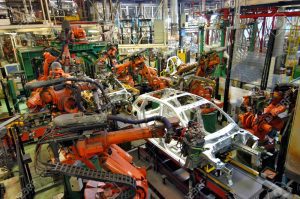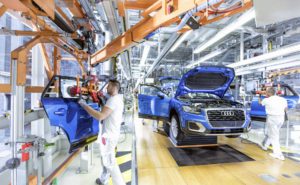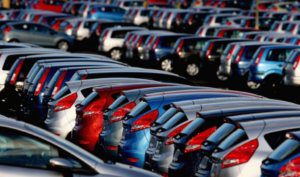
In January 2020 Ukrainian automobile manufacturers tentatively produced 849 vehicles, which is 5% less year-over-year, the Ukrautoprom association has reported.
The association recalled that Ukraine’s production facilities allow producing more than 30,000 vehicles.
Car assembly in January decreased by 5% to 787 units. As before, all statistics in this segment is formed by the SKD assembly of Skoda cars at the Eurocar plant.
Bus production decreased by 10% to 54 units, and Cherkasy Bus, which produced 30 vehicles (25% less than in January 2018), remains the leader in this segment. Chasiv Yar bus plant (Donetsk region) produced 13 buses, against three in January 2019, Chernihiv Automobile Plant of the Etalon Corporation made ten units against 14 last year and one bus was produced at Zaporizhia Automobile Plant (ZAZ) (four units a year ago).
Last month, only Cherkasy Bus reported on the production of commercial vehicles – eight units (twice as much as in January 2019). AvtoKrAZ still does not provide production data.
According to the statistics of the association, compared to December 2019, the production of vehicles in January 2020 increased by 52%, but only due to an increase in assembly at Eurocar by 82.2%, while the production of buses almost halved and that of commercial vehicles decreased by 54.6%.
As reported, Ukrainian automobile manufacturers in 2019 produced 7,265 vehicles (including 6,254 cars at Eurocar), which is 10% more than in 2018. However, capacity utilization did not exceed 2%.

Legal entities in Ukraine in January-September 2019 purchased and registered 20,300 passenger cars, which is 12% more than for the same period in 2018, including 19,000 new cars and 1,300 imported used cars, Ukrautoprom has said.
According to the association, the share of new cars in total corporate acquisitions this year was 97% compared to 93% a year earlier.
As for new cars, the highest demand among legal entities was recorded for Renault brand cars with 4,457 cars, Toyota ranked second with 2,968 cars, and Skoda ranked third with 2,533 cars.
When choosing imported used cars, legal entities more often chose Volkswagen cars, having acquired 173 passenger cars of this brand since the beginning of the year. This is followed by Nissan (129 units) and Mercedes-Benz (113 units).
Ukrautoprom noted that since the beginning of the year, 383,300 cars have been registered in Ukraine, of which 61,700 are new cars and 321,600 were used cars imported from abroad.

Production of vehicles in Ukraine through January-July 2019 decreased by 12.6% compared with the same period of 2018, to 3,562 vehicles, assembly of Skoda passenger cars by Eurocar Plant saw 12.4% slowdown, to 3,066 cars.
According to statistics of Ukrautoprom association posted on its website, thus decline rate of vehicle production slightly slowed down compared to the similar period of 2018 and was 23.5%.
The production of commercial vehicles was 2.5 times less: only 46 vehicles were manufactured for the seven month (excluding AvtoKrAZ, which has stopped disclosing production information since August 2016), including 39 by Cherkasy Bus (29 in 2018), and seven by Zaporizhia Automobile Plant (ZAZ, 85 vehicles)
The production of buses saw light negative trend by 2.4%: 450 buses were produced, against 461 a year earlier. The Cherkasy Bus with 220 buses for the mentioned period remained the leader of their production, the Chernihiv Automobile Plant increased production by five buses and produced 99 units, the ZAZ produced 40 buses against 24 a year ago, Bogdan Corporation manufactured 44 buses against 4 items a year ago, and the Chasiv Yar Bus Plant saw 47% fall in bus production, to 47 units.
The association reported that in July the national enterprises assembled 613 vehicles that 2.8 times more that in July 2018 and 10% more that in June 2019.
This growth pace is linked to the increase of assembly of Skoda passenger cars by Eurocar Plant up to 534 units against 150 in July 2018.
The producers of commercial cars increased output up to 25 units in July (five units in 2018), while bus production shrank from 66 to 54 units. The biggest number of buses was produced by the Cherkasy Bus.
As reported, in 2018, the Ukrainian automakers produced only 6,616 vehicles. This was 23% less than a year earlier, and production capacity was loaded less than 1.5%.

The resumption of obligatory personal vehicle inspection initiated by the Infrastructure Ministry of Ukraine would not improve their safety, although it could result in the resumption of corruption schemes applied earlier, according to lawyers polled by Interfax-Ukraine.
“This bill, in our opinion, is a purely commercial project that will not affect road safety in any way. Infrastructure associated with the passage of MOT tests will appear and quickly develop, including without the inspection of a vehicle. In this area corruption and illegal turnover of cash will develop,” says Alexander Keer, managing partner of the DTP Expert law firm.
He also predicts that “mandatory inspection will lead to the fact that all cars, including cars with European license plates, will be somehow registered.”
“In Ukraine at present, according to various estimates, there are several tens of thousands of cars that drive not entirely legally. Cars with foreign number plates are only part of them, and there are still stolen, confiscated and other cars. If mandatory inspection is introduced, then when these cars pass through, they will be identified. Some of these cars were resold, then their owners, who purchased cars as a result of a legal transaction, will be in a difficult situation,” he said.
The lawyer predicts that “for the inspection of illegal cars will also apply illegal schemes that will not guarantee a good technical condition of the vehicle.”
“You can also expect a decrease in the number of “clone cars,” but the number of fictitious data on the passage of vehicle inspection may increase,” he said.
At the same time, Keer predicts that “mandatory inspection will improve the detection of crimes related to cars illegally located on the territory of Ukraine.”
At the same time, the lawyer said that “technical failure of cars is very rarely recognized by the court as the cause of an accident, especially when it comes to commercial vehicles, in particular, heavy trucks, special vehicles and carriers of dangerous goods.” Nevertheless, the consequences of such accidents can be very serious both in material terms and in terms of the number of casualties (injured and dead citizens).
“Very few road accidents initiated after a technical malfunction of the car reached the courts. In such cases, it is much easier for the parties to place the responsibility on the driver than directly on the technical condition of the vehicle, because if the court recognizes the malfunction of the car, the head of the transporting company will be responsible. The company may lose the license for transportation, therefore, most of the responsibility is shifted to drivers,” he said.
At the same time, Keer believes that the adoption of this bill could significantly increase the number of appeals to court. In particular, service stations that do not receive the licenses to conduct a technical inspection will file lawsuits.
In turn, lawyer of the K.A.C. Group law firm Dmytro Polischuk said that the proposed bill, first of all, is aimed at cars with mileage and will increase the level of protection for buyers of used cars from unscrupulous sellers, which has already been confirmed by the experience of European countries where buying a used car is not a “cat in a bag” purchase.
In turn, K.A.C. Group lawyer Hanna Kuznetsova said that in the period from January to April 2019, there were 2,445 road accidents in Ukraine, in which 7,804 people had injuries of varying severity and 822 people were killed. At the same time, the share of accidents as a result of speeding is 35%, violation of maneuvering rules – 20%, violation of intersections rules – 8%, violation of crossing rules – 8% and non-observance of a safe distance – 6%.
“These data indicate that technical failure of cars is not a very common cause of an accident,” she said.
For her part, lawyer of Ario Law Firm Natalia Shvets said that the introduction of mandatory vehicle inspection for cars will not cause a burst of lawsuits by car owners and organizations that will conduct this inspection.
“For law-abiding drivers, there will be no problem to pass a technical inspection of their vehicle,” she said.

Production of vehicles in Ukraine in January 2019 grew by 56.7% compared with January 2018, to 893 vehicles, and the growth pace is linked to the assembly of Skoda passenger cars by Eurocar Plant, which grew by 73%, to 828 cars, the Ukrautoprom association has reported.
Eurocar improved its production 4.2-fold compared with December 2018.
The association said that today Eurocar is the only enterprise in Ukraine where the production of passenger cars continues.
At the same time, the production of commercial vehicles fell by more than 63%: only five vehicles were manufactured in a month (excluding AvtoKrAZ, which has stopped disclosing production information since August 2016), including four by Cherkasy Bus (two in January 2018), and one by Zaporizhia Automobile Plant (ZAZ, 30 vehicles)
The production of buses practically did not change: 60 buses were produced, against 59 vehicles a year earlier. The Cherkasy Bus (40 buses in January 2019 compared with 12 in January 2018) remained the leader of their production, the Chernihiv Automobile Plant (14 compared with 20 the previous year) was the second, the ZAZ and the Chasiv Yar Bus Plant made three buses each (compared with seven buses and 17 buses, respectively). Not a single bus was produced by Bogdan Corporation (three buses in January 2018).
Compared with December 2018, the output of buses in January decreased by 21%.
As reported, in 2018, the Ukrainian automakers produced only 6,616 vehicles. This was 23% less than a year earlier, and production capacity was loaded less than 1.5%.
At the same time, passenger car assembly decreased by 22%, to 5,660 cars (including Eurocar produced 5,659 cars, 7.9% less), commercial vehicles (excluding products of AvtoKrAZ) – by 73%, to 132 units. A slight positive trend was seen only in the production of buses – an increase of 2.5%, to 824 units.

The primary registration of commercial vehicles in Ukraine (new and used ones) in 2018 grew by 20% compared with 2017, to 51,500 vehicles, the Ukrautoprom association has reported. The association said that the share of new vehicles was only 25% of primary registrations of commercial vehicles: demand in the segment grew only by 10%, to 12,700 units, while registrations of imported used vehicles rose almost by 25%, to 38,800.
Renault became the leader in new vehicle registrations last year, with 2,429 license plates being issued – 13% more than the year before, Fiat ranked second: 1,327 registrations and an increase of 13%.
Mercedes-Benz closed the top three leaders: 1,047 new vehicles were sold (a rise of 28%).
Renault is leading in the segment of used imported cars: for the year, 9,407 vehicles received Ukrainian registration, which is 30% higher than last year.
The second most popular brand was Volkswagen, which registered 4,941 vehicles (15% more).
Mercedes-Benz is in third place, as in the market for new vehicles, with 4,911 units (a rise of 22%).